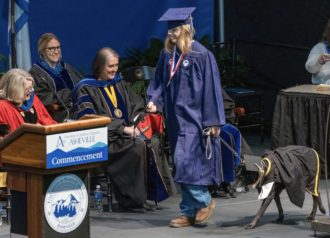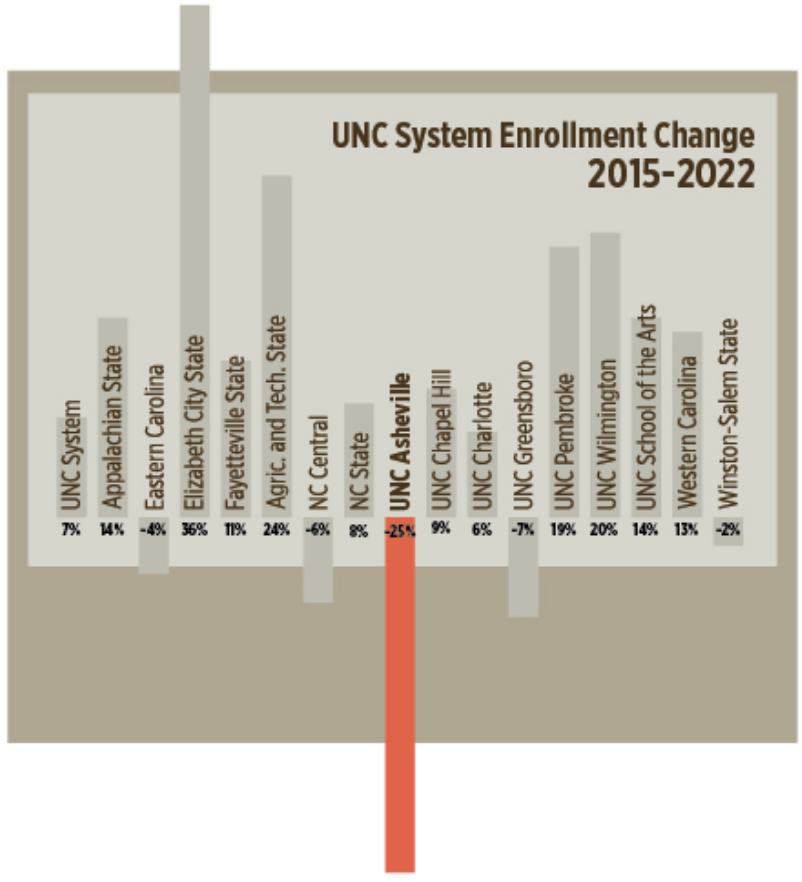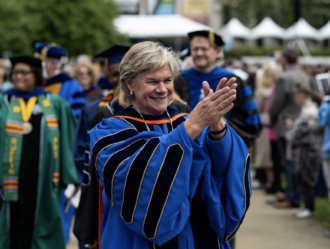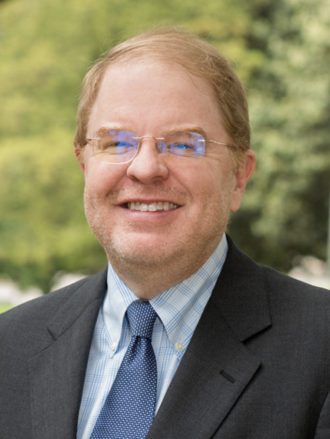By Barbara Durr, Asheville Watchdog
Student enrollment and retention are plunging at UNC Asheville, and top leadership is once again departing, including Nancy J. Cable, the fifth occupant of the chancellor’s office in the last eight years.
Senior staff and faculty are leaving too, including tenured professors, at the highest rate in the entire UNC system. Many of them said their salaries have not kept pace with the rising cost of living in Asheville, especially in housing.
While overall student enrollment in the UNC system grew 7% since 2015, UNC Asheville fell by a stunning 25%, the biggest drop among the 16 public universities in the system, an Asheville Watchdog analysis found. Enrollment for the fall semester this year was 2,914, down 10% from the same period last year — and five times the rate of decline of the UNC system as a whole.

Of the incoming students UNCA is able to attract, a high number of them leave before graduation. Retention of students, measured as those returning for a second year of school, is now just 68.6%, the lowest level in 10 years, according to the Institutional Research, Effectiveness and Planning department at UNCA. In 2012, retention — a key metric of college and university performance — was 80.2%.
“Campus leadership has been and is well aware of the challenges and opportunities we face in terms of recruitment and retention,” said Michael Strysick, the university’s chief communications and marketing officer. “We have been under-resourced and under-funded for the past decade.”
Universities nationwide are experiencing enrollment declines, especially since the COVID-19 pandemic. But UNCA’s downward trends in key measures of academic institutional health — weaknesses that were evident even before the pandemic — raise questions about the campus’s future.
There is also a growing faculty concern that an increasingly political UNC system in Chapel Hill, whose Board of Governors is appointed by the Republican-dominated General Assembly, might try to exert more control over UNCA, one of the smallest and remotest schools in the system. UNCA is also the state’s only dedicated public liberal arts campus, in a town known for its liberal activism.
Faculty and staff turnover

UNCA tops the list for faculty and staff turnover across the whole UNC system, reaching 11.7% from academic year 2017/2018 to 2020/2021 — again, a trend that began before the pandemic.
“Morale is an issue,” said former UNCA assistant professor of biology Rebecca Helm, who left earlier this year.
Former faculty members cited pay scales that haven’t kept pace with the high cost of living in Asheville, which also makes it harder to recruit and hire replacements.
Strysick said UNCA has the second lowest-paid faculty in the system, trailing all but UNC Pembroke, in Robeson County near Lumberton.
The median cost of a home in Robeson County is $84,600, while in Buncombe County, it’s $353,000.
Over the last five years, salaries for top teachers at UNCA have actually decreased. In 2017, the average salary for UNCA full-time instructional staff, including full, associate and assistant professors as well as non-tenure-track staff, was $77,911, according to UNCA researchers. In 2021, the most recent year for which figures are available, the mean salary for those posts fell 6% to $73,389.
Cable’s salary is $350,089.
The faculty members also cited overwork, lack of resources, a lack of transparency and sense of disenfranchisement from university leadership decision-making.
Students are being taught by less-experienced and less-qualified teachers, as the university increasingly replaces tenured and tenure-track veteran faculty with lower-paid adjuncts, UNCA data show. And, because of the pandemic, many classes over the past two years have been taught remotely, a less effective way to teach and learn.
Nearly one-third of incoming students don’t return
Academicians say UNCA’s 68.6 percent retention rate is particularly troubling.
“This metric matters greatly because more attrition happens in the first year than any other time, and it directly drives graduation rates in future years,” Jeffrey Konz, the director of Institutional Research at UNCA, wrote to faculty and staff colleagues in September.
“Our retention issues are not driven by admission standards,” Konz said, yet “more than half of exiting students were in academic difficulty (UNCA PA <2.0), higher than in previous years.” PA refers to grade point average.
The declines in enrollment and retention are also financially troubling for UNCA because the state system uses those figures to calculate its support for each school.
“Growth is the currency within the system,” Kevin McClure, associate professor of higher education at UNC Wilmington, told Asheville Watchdog. And UNC Asheville is shrinking.
Peter Hans, president of the UNC system, said in an email to Asheville Watchdog, “Like universities across the country, UNC System schools are facing demographic headwinds driven by the nationwide decline in the pool of recent high school graduates. After several decades of growth, North Carolina’s population of 18-24-year-olds will be flat or declining over the next 20 years.”
The COVID-19 pandemic hammered higher education nationally and in North Carolina. From 2021 to 2022, undergraduate enrollment in four-year public schools declined nationwide by 1.6 percent, while the UNC System declined by 2 percent.
UNCA’s enrollment decline started before then. In 2017 and 2018, under previous leadership, the admissions office discontinued high school recruitment visits, Strysick said.
And for the class entering in 2018, he said, the university increased the admissions rate — the percentage of students accepted of those who apply — to 93%, making UNCA among the least-selective schools and therefore less appealing to students.
Those two changes combined, Strysick said, were “unfortunate choices.”
Strysick said he is hopeful that retention is beginning to turn around: 95% of this fall’s first-year students are registering for spring classes.
Turnover at the top
The resignation Oct. 12 of Cable as chancellor of UNCA capped a series of key departures at the school, including the provost (the second-ranking position) and other top staff and faculty, including several college deans and tenured professors.
Cable declined to be interviewed by Asheville Watchdog, handing off responses instead to Strysick, who recently replaced a senior staffer who left this summer.
Strysick said UNCA’s enrollment challenges and faculty departures “had nothing whatsoever to do with [Cable’s] decision to step down as Chancellor.” She had an offer to become the executive director of the William R. Kenan Jr. Charitable Trust in Chapel Hill, allowing her to return to the world of philanthropy, he said. Cable previously was president of the Arthur Vining Davis Foundations.
Yet, in the context of institutional stability, Cable’s decision was another setback for UNCA. She was the fifth occupant of the chancellor’s office in the last eight years, a remarkable level of turnover at the top for a university.
Cable was preceded by interim chancellor Joe Urgo in 2017-2018, chancellor Mary K. Grant in 2015-2017, and another interim chancellor, Doug Orr, in 2014. Anne Ponder was chancellor 2005-2014.
Kimberly Van Noort, formerly senior vice president of academic affairs for the UNC system, will take over as interim chancellor after Cable leaves at the end of December.
Van Noort came to UNCA this summer to be interim provost, replacing Garakai Campbell, who left after serving as provost and vice chancellor for academic affairs since June 2019.
Van Noort in turn is expected be replaced by a permanent chancellor next year, which would make it an extraordinary tally of seven leaders in nine years.
“Based on the best data that we have, on average the tenure of a chancellor or president is around 6.5 years,” McClure, the UNC Wilmington expert on higher education management and leadership, told Asheville Watchdog. Multiple successions in an executive leadership position in that span of time “definitely creates challenges,” he said.
Plans repeatedly interrupted
One of the main challenges, and one that has roiled faculty, is that the university’s leaders develop new strategies or plans for change, then leave before the plans can be executed.
“Typically, what has been happening is you get a new chancellor and then a new provost, and then they all say: ‘Okay, we’re going to now do this,’” said Chris Hennon, who started at UNCA in 2005 and left his tenured professorship in atmospheric science earlier this year. “It’s been a lot of turnover in leadership. They plan all these big changes. And then by the time it gets to the point where we’re ready to go, they leave.”
McClure also noted that the priority of interim leaders is often “just to keep the trains running,” making them unlikely to launch major initiatives.
“And of course, as is the case here, it does lead to questions on the part of faculty around ‘what’s going on here?’ And it’s difficult to build up trust with important groups on campus, including faculty, staff and students,” he said.
Other nearby schools are less expensive
Brian Drawert, a former UNCA professor of computer science, noted that the school was excluded from the 2018 NC Promise program that lowered tuition at four UNC system schools, including Western Carolina University, just an hour’s drive from Asheville. In-state students at Western Carolina pay $1,000 a year for tuition, one-fourth of what students pay at UNCA.
“I would guess that this has exacerbated the already falling enrollment,” Drawert said. “All of these things together make me wonder if the UNC system is not intending to close UNCA in the near future and wonder if that decision is politically motivated.”
A spokeswoman for the UNC system said UNCA has the board’s full support, and that a UNC institution has never been closed.
Hans, the president of the UNC system, told Asheville Watchdog in an email that UNCA “has a proud history and serves as an anchor institution for a vibrant and fast-growing region. We’re confident that UNC Asheville can thrive in a changing education landscape, and we’re excited about the work underway.”
“Under-resourced and underfunded”
Despite UNCA’s declining tuition income as its enrollment shrank, the school’s state funding was flatlined for the five years between 2017 and 2021 at an average annual allocation of $40.5 million, according to UNCA Institutional Research.
But UNCA’s state funding increased last year as a result of Cable’s multiyear advocacy for additional funds from the UNC system to support a “Revitalization Plan” that she put in place in 2019.
The state provided $52.1 million for 2021-2022, a jump of $11.5 million over the previous academic year.
Strysick said that the state’s additional funding included a one-time $3 million matching grant last year to create the Asheville Trust endowment, to help reduce or eliminate student debt; plus a recurring $7 million annually, composed of $2 million in scholarships and $5 million to strengthen enrollment and retention and improve student experience.
This year the university would have received $47.6 million from the state, counting the newly added $7 million. But the drop in enrollment at UNCA has bitten into that sum.
The UNC Board of Governors approved a proposal Nov. 17 that would cap the drop in 2023 funding at 4.5 percent. The cap will soften the blow to UNCA, which was facing a 5.7 percent drop amounting to a $2.7 million shortfall. It is estimated now that UNCA will lose $2.1 million.
However, the North Carolina legislature this year approved a 3.5 percent increase in salaries and benefits for staff and faculty across the UNC system in an attempt to keep pace with inflation, giving UNCA an additional $2.8 million.
The Revitalization Plan’s goals include increasing enrollment and retention, and the launch of four master’s degree programs: public health, climate resilience, creative writing, and engineering.
Graduate programs give the UNC System schools some financial cushion, McClure said. While the state controls tuition for undergraduate education, schools can, and do, charge more for their graduate programs.
But the only master’s program that UNCA has added so far is in public health, in collaboration with UNC Chapel Hill’s Gillings School of Global Public Health and the Mountain Area Health Education Center.
Strysick said he was confident that the “Revitalization Plan” will put the school on “a comprehensive path forward to strengthen the University as a whole, which will in turn positively impact enrollment and retention.”
Strysick added that a fresh marketing effort to attract students to the school is underway, including a website redesign, digital campaigns to build the applicant pool, more high school visits, additional campus tours for prospective students and their families, and more branding “to better articulate our market position.”
UNCA’s marketing will be contending with the low-priced tuition at four other UNC system schools: Western Carolina University in Cullowhee and Biltmore Park; UNC at Pembroke; Fayetteville State University; and Elizabeth City State University. Under the 2018 NC Promise program of the Board of Governors, which aimed to offer higher education in what were considered under-served areas, these schools have frozen tuition at just $1,000 a year for in-state students, compared to $4,122 at UNCA.
Low pay in high-cost Asheville
The number of UNCA faculty, particularly tenured and tenure-track faculty, has declined in recent years, with adjuncts — part-time teachers who are paid less than faculty — teaching more and more classes.

In 2017, UNCA had 224 full-time instructional staff, with full professors, associate professors, and assistant professors making up 81% of the total, according to UNCA’s Institutional Research department. By 2021, the teaching staff had been reduced to 211, and the percentage of full, associate, and assistant professors fell to 72%.
Fourteen faculty departed so far in 2022 alone, five of which were retirements, according to Christy Williams in human resources at UNCA. At least three others have taken leave and are no longer teaching, including tenured sociology professor Lyndi Hewitt, who is now an organizational development consultant.
“In four years, I struggled to find affordable housing,” Helm, the former assistant professor of biology who left earlier this year, told Asheville Watchdog. She said she was reluctant to leave, but faulted the state funding formula for lack of salary growth. She is now at Georgetown University.
“There are deeply passionate folks over there, but that deep passion can only take you so far when you can’t necessarily provide the type of life and standards that you’d like to have for your family,” said Sarah Broberg, the former communications chief at UNCA, who left in July to build her own consulting business. She said salaries “don’t even come close to touching inflation.”
Drawert, the former professor of computer science, shifted his status to visiting researcher so that he could complete a five-year grant from the National Institutes of Health that ends next June. He works remotely from California.
“The financial support of the institution was just terrible,” Drawert told Asheville Watchdog. “They’re not paying enough to keep good faculty and staff.”
Besides, Drawert said, “Our dedicated classrooms were just in terrible shape. Projectors were 10, 15 years old. In some computer labs, the desks were so old they had exposed metal that had cut me. The computer science department doesn’t have more than one dedicated classroom with computers in it.”
Nonetheless, he said, his students went on to well-paid jobs “making 150%, 200% of what faculty were making.” Some landed prestigious jobs at NASA and the National Security Agency, he said.
Faculty unhappiness also stems from overwork, including an often heavy teaching load of four courses per semester, plus additional administrative and other assignments beyond teaching. Workload was the top concern identified by the Faculty Welfare and Development Committee as far back as 2018, when Cable started as chancellor.
The committee said in a report that year to the Faculty Senate that the workload “is unmanageable, unsustainable and continues to grow.”
Also, where once the dean of students stepped in to help struggling students, that support is now largely left to faculty. Some faculty said they are now being blamed by the university’s leadership for students leaving.
Patrick Bahls, a tenured professor of mathematics, was at UNCA for 17 years until “the deteriorating state of affairs” prompted him to leave June 30. Bahls said many students recruited to UNCA “need a good deal of support, whether that’s academic or mental health, you name it, and we can’t provide the support they need.”
Helm said, “The issue for me is that when faculty are stretched thin and not supported, it is harder for them to support students. I worried that as the situation grew more difficult I wouldn’t be able to take care of them as they need to be.”
“Students aren’t happy because they have this churn and burn of faculty,” said one tenured professor who spoke on the condition of anonymity. “They don’t have consistent professors through their four years that they can bond with.”
Transparency and shared governance
Faculty complained about lack of transparency around key decisions by UNCA administrators.
“Where that manifested was in the higher-level decisions about chairs, program directors and that sort of appointment.” Bahls said. “There would be a big pretense of we’re going to have a committee or we’re going to publish the job description, we’re going to publish the criteria. Here’s who is going to be involved. Then all of a sudden, after two or three months of silence, there would be an appointment made and people would be like ‘Huh, what just happened?’”
Current students are also concerned with transparency.
“I think students have a right to know,” about leadership and faculty departures, said Celestine Epps, a senior studying mass communication. “Nowadays, whenever we see an email informing the student body of a faculty/admin departure, it’s like ‘who is it this time, guys?’”
“I’d like to know why [Cable’s] leaving,” said Olivia Kane, a transfer student and senior in interdisciplinary studies. “When they’re not forthcoming, most people’s automatic assumption is ‘Oh it must be some really big problem.’”
Not all faculty are unhappy
Jeffrey Wilcox, a tenured professor of geology in the environmental studies department, said he is happy with his job. “I’m loyal to UNCA,” Wilcox said. “I want to see the school succeed.”
But “the turnover of staff and faculty doesn’t help us,” Wilcox said, noting that without a new permanent chancellor until summer, “change is even further off.”
Top administrative staff, including Amanda Bell, the former director of Institutional Research, Effectiveness and Planning, and Broberg, the former chief of communications and marketing, have departed in recent months.
Between 2020 and 2021, three deans, a top post at the university, also left, including the dean of humanities, dean of natural sciences, and the dean of social sciences, according to UNCA faculty.
Hans, who led the North Carolina Community College system before taking the reins at the UNC system, said in his email to Asheville Watchdog that the Board of Governors has been “focusing on affordability and value, investing in online options to better serve working adults,” and updating its funding formula to incentivize retention and student success. For UNCA and a few other schools the Board is increasing the admission of out-of-state students to 25%, from 18%, to bolster tuition income. Non-resident tuition at UNCA is $21,470 a year.
UNCA will now boost recruitment of out-of-state students to enhance overall enrollment, Strysick said.
Concern over political meddling
Yet, there is a lingering suspicion among faculty the Watchdog spoke to at UNCA that the Board of Governors could have some animosity toward the school — possibly because they misconstrue liberal arts education with liberal political inclinations — or at least a tendency to ignore the school and its needs.
“My perception is that UNC Asheville is an institution that doesn’t get a lot of attention, despite being in a location that itself garners quite a bit of attention,” said McClure at UNC Wilmington. In part, he said this is because it is geographically far from the “point of power [Raleigh], and that matters.”
“The bigger thing I would be worried about if I were faculty there, is that we can’t seemingly figure out how to do a chancellor search in the system without politics being part of it,” McClure said.
The political meddling in the UNC Wilmington chancellor search was revealed in The Assembly story “Tim Moore’s Heavy Hand” in October.
“We thought that maybe we had escaped that. Now, I’m like, nobody’s going to escape it,” McClure said. He said he would not be surprised if someone in the state Republican political machine hasn’t got their eye on the Asheville chancellorship.
Concern about “undue political influence and bureaucratic meddling” hindering university governance recently prompted Gov. Roy Cooper to create a state-level commission to examine governance of the UNC system.
All eyes will now be on UNCA’s next chancellor search, which will unfold just as Cooper’s new commission gets under way. It is likely to be seen as a test case of how political influence is exercised across the system, and of how UNCA may be able to right its course.
Asheville Watchdog is a nonprofit news team producing stories that matter to Asheville and Buncombe County. Barbara Durr is a former correspondent for The Financial Times of London. Contact her at bdurr@avlwatchdog.org.
Hayden Bailey, a journalism student at UNCA, contributed to this report.






The author likely has the causality pointing in the wrong direction. A sizeable % of students attended college to get a degree and an ROI on their time, $ and effort. Degrees are less important than they once were, esp in many of the “softer” liberal arts areas. That reduces demand for college, esp schools like UNCA. We simple don’t need all the supply for current demand.
UNCA is a tremendous and underrated liberal arts affordable university which expands the minds of conventional and unconventional students offering a well-rounded education. This university is the best thing about Asheville and has been for the past twenty (20) years.
The largest employer BY FAR in Buncombe County is HCA / Mission Healthcare. Yet new RNs with Associate Degrees and who prefer hands-on training to on-line (as many older RNs do) have to travel as far away as Cullowhee, Boone, Boiling Springs, and Hickory to earn the BSN and MSN that are needed to progress beyond a 5-year career at HCA / Mission.
Meanwhile the college just up the street is limited to producing graduates in pottery, poetry and vegan transgender studies.
Doesn’t sound like a good ROI to me.
Could a spokesperson at UNCA tell us how many graduates in management and accounting UNCA produces each year? Could that person tell us how many doctors and other health care providers are graduates of UNCA? Could a UNCA spokesperson tell us about the engineers UNCA has produced? Could a UNCA spokesperson tell us how many best-selling authors UNCA has produced? (Readers might find it surprising.) Could someone at UNCA tell us how many lawyers are graduates of UNCA?
There are several questions here. Why did the author if this piece not interview the chair of the faculty senate and other faculty senate leaders? Why did the author not interview the chair of the board of trustees?
Most importantly, why has no one with real standing and responsibility (Nancy Cable, Kimberly Van Noort, the Provost) at UNCA replied to this article?
I’m a physician and UNCA is my alma mater. The school provided me an excellent, well-rounded education that prepared me well for medical school. Perhaps you should learn more about the school before shitting on it.
UNC Asheville is our public liberal arts and sciences campus, not a tech school. There is definitely a place for both in our community, and in our seventeen campus UNC system.
UNC Asheville has graduated entrepreneurs, scholars, community leaders, engineers, musicians, authors, teachers, nurses, and people who prepared for medical, law, and higher degrees in many fields. Interdisciplinary, inquiring minds that think critically are needed in our complex and changing world. Businesses and organizations are stronger, leaner, and more effective including team members who have such broader frames of reference.
Those of us who are alumni have a devotion to our mission of being the public, affordable, Liberal Arts campus of the UNC System. We do need to stand up and support strengthening the future as we near the hundredth anniversary of Buncombe County Junior College, aka UNC ASHEVILLE.
Thanks to Mr. Thomson for this helpful perspective.
You don’t understand apparently that was not Ms. Durr’s purpose. This is actually fairly simple. Supply for education exceeds current demand by a considerable margin. The state has maintained and increased its contribution in spite of declining enrollment. Less expensive options exist in nearby towns. UNCA is a dinosaur.
UNC Asheville provides a valuable experience for students seeking an affordable, public option for an interdisciplinary, liberal arts education. AB Tech provides a valuable experience for technical and career development. NC is known for our University and Community College system and the commitment to investments in the future of our people.
Generations of UNC ASHEVILLE graduates have become successful entrepreneurs, teachers, accountants, meteorologists, engineers, community leaders, and more have been prepared for success in higher education for medical, legal, and other professional studies.
Our community and our alumni should pay attention and support strengthening and energizing the continued success of UNC ASHEVILLE.
“One of the main challenges .. is that the university’s leaders develop new strategies or plans for change, then leave before the plans can be executed.“ Sounds like a problem the ever-optimistic reparations committee has endured since the beginning while precious dollars are still being spent on their leadership. An ex-professor has a lot to think about after reading this article. Let’s hope all *his education and experience will help him identify solutions for both the committee and the school, even be they painful. In his house he probably doesn’t teach spending money outside their budget, and they know he won’t abandon them.
Put that lesson in the news. We all need to hear it.
Glad I read this article, and its perspective, before my son chooses his college next year. While UNCA is the “closest” choice it may not be the best choice.
While this is disheartening, it is not particularly surprising. The liberal arts in American higher education has been on the endangered species list for quite some time now ….and unfortunately it looks bleak going forward. We simply don’t have a society that values a liberal arts education… nor are we finding many -if any- viable career path options open for these graduates outside of medical or law school. All the talk about the “marketplace” and “supply and demand” as seen in some of the responses above clearly show just how close we are now to having a basically illiterate electorate…. and we’ve seen very clearly lately just what that has done for our country. We’re in big trouble, and UNCA’s troubles vis a vis their heavily skewed liberal arts curriculum is just another sign of things to come.
Educational policy and investment strategies should be managed by other means than anonymous drive-by comments. It doesn’t take a broad interdisciplinary exposure to humanities and social science education to discern that to be true.
uh, what?? …I rest my case with the above prima facie evidentiary statement of fact, lol ;)
LMFAO
Here’s some more helpful information. https://www.jamesgmartin.center/wp-content/uploads/2023/01/Student-Loan-Debt-and-Earnings-at-North-Carolina-Universities.pdf